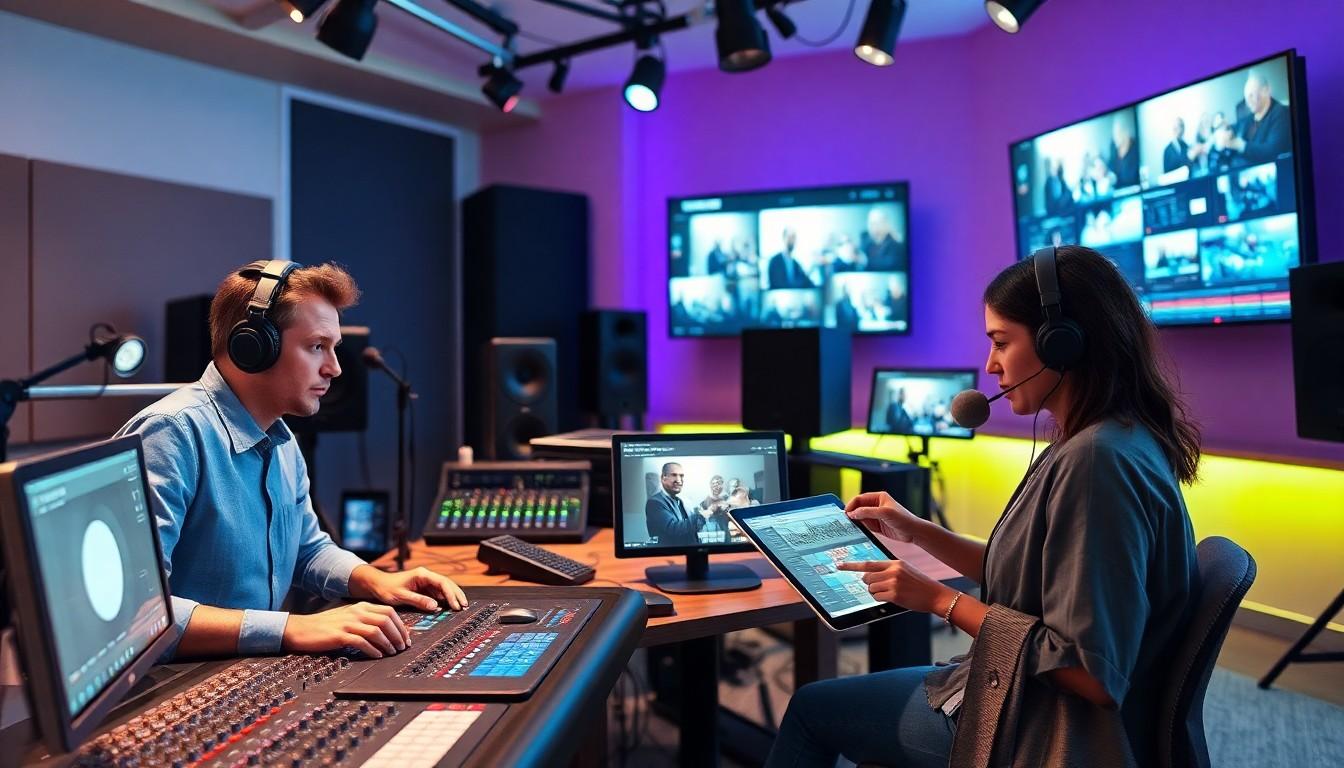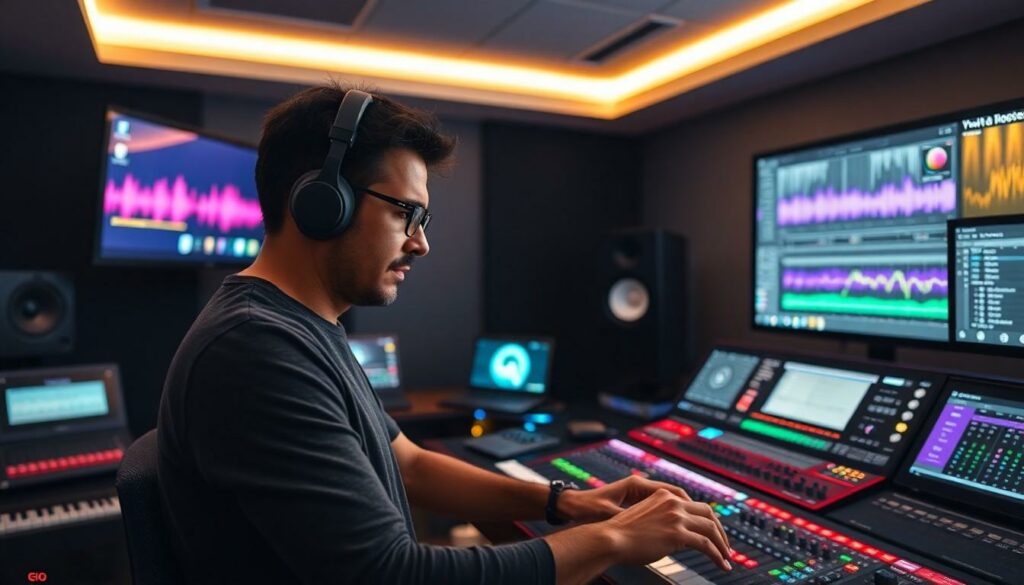Table of Contents
ToggleIn a world where every cat video goes viral and podcasts are the new novels, arts audio video technology and communications jobs are booming like never before. Whether it’s crafting the perfect sound bite or designing jaw-dropping visuals, these roles are the unsung heroes behind the scenes, turning creative dreams into reality.
Overview of Arts Audio Video Technology and Communications Jobs
Growth in arts, audio, video technology and communications jobs reflects the rising demand for creative talent. Individuals working in this sector play vital roles in producing and enhancing multimedia content. Positions such as sound engineers, video editors and production coordinators require both technical skills and artistic vision.
Career opportunities span various industries, including film, television, advertising and live events. Job seekers often benefit from strong portfolios showcasing their previous work. Employers value experience in software tools like Adobe Creative Suite and Final Cut Pro.
Diverse roles within this field attract a range of professionals. Audio technicians handle sound production while cinematographers capture visual storytelling. Communications specialists develop strategies for enhancing brand narratives through various media platforms.
Educational paths often focus on degrees or certifications in related fields, allowing employees to gain essential skills. Colleges and universities provide programs in media arts, digital communication and broadcast technology. These educational opportunities equip students with the foundational knowledge needed in this rapidly evolving industry.
As technology advances, remote working options expand for many job functions. Professionals can now collaborate from various locations, enhancing project efficiency. Innovations in virtual reality and augmented reality create new opportunities within the sector, pushing boundaries in how content is delivered.
Networking often plays a crucial role in securing job opportunities. Attending industry events and connecting through platforms like LinkedIn helps professionals build relationships. Staying current with trends through podcasts and workshops ensures individuals remain competitive in the job market.
Key Roles and Responsibilities

Professionals in arts, audio, video technology, and communications carry diverse responsibilities that shape the industry. They specialize in a variety of areas, each playing a crucial role in the overall production process.
Audio Engineering
Audio engineers focus on sound capture and manipulation. They operate recording equipment, ensuring clarity and vibrancy in audio output. Mixing and mastering tracks fall under their expertise. Collaboration with musicians, directors, and producers enhances the creative process, resulting in high-quality soundscapes. Familiarity with software like Pro Tools and Logic Pro remains essential for success in this role.
Video Production
Video production professionals handle all aspects of visual content creation. They manage pre-production tasks, including scriptwriting and storyboarding. Filming, editing, and post-production tasks comprise their day-to-day activities. Communication skills play a key role while collaborating with various team members, from directors to graphic designers. Experience with tools like Adobe Premiere Pro and Final Cut Pro supports effective video storytelling.
Communication Design
Communication designers develop visual narratives that convey messages effectively. They utilize graphic design skills to create layouts for digital and print media. A strong understanding of branding principles guides their work, ensuring consistency across platforms. Proficiency in Adobe Creative Suite remains crucial for creating compelling visuals. Engaging audiences through diverse media types is an essential aspect of this role.
Required Skills and Qualifications
Professionals in arts, audio, video technology, and communications require a mix of technical and soft skills to succeed in their roles.
Technical Skills
Proficiency in industry-standard software remains crucial for job seekers. Knowledge of tools like Adobe Creative Suite and Final Cut Pro is essential for video editing and design tasks. Understanding sound engineering principles ensures clear audio output in projects. Familiarity with equipment such as cameras and microphones enhances production quality. Mastering digital communication techniques strengthens content delivery across various platforms. Experience with emerging technologies, like virtual and augmented reality, sets candidates apart in a competitive landscape.
Soft Skills
Strong communication skills foster effective collaboration among team members. Creativity and innovative thinking contribute to unique solutions for projects. Attention to detail ensures high-quality output during editing and production processes. Adaptability and flexibility help professionals navigate the fast-paced industry landscape. Time management skills enable meeting tight deadlines without compromising quality. Networking abilities facilitate connections with industry peers and potential employers, promoting career growth and opportunities.
Industry Trends and Future Outlook
Rapid advancements in technology shape the future of arts, audio, video technology, and communications. These innovations create both opportunities and challenges for professionals in the field.
Emerging Technologies
Virtual reality and augmented reality gain traction in various media applications. Professionals in the audio and video sector increasingly adopt these tools to enhance viewer experiences. Drones for aerial shots and high-definition cameras redefine standards for video content. Networked collaboration platforms promote efficiency and creativity among remote teams. Moreover, artificial intelligence streamlines editing processes and enhances sound design, transforming traditional workflows.
Job Market Demand
Job opportunities in this sector continue to expand significantly. The rise of streaming services and digital content creates a constant need for skilled audio and video professionals. According to the U.S. Bureau of Labor Statistics, employment of sound engineering technicians and film and video editors is projected to grow by 11 percent from 2020 to 2030. Remote work trends enable more geographical flexibility, leading to diverse job openings. Candidates with strong portfolios, relevant experience, and proficiency in industry-standard software face better chances of securing positions in a competitive market.
The landscape of arts audio video technology and communications jobs is vibrant and ever-evolving. Professionals in this field play a crucial role in shaping how audiences engage with content across various platforms. With the rise of new technologies and remote work opportunities, the demand for skilled individuals is only set to increase.
As the industry continues to innovate, staying updated with the latest tools and trends is vital for career success. Aspiring candidates should focus on building strong portfolios and honing their technical and soft skills. By doing so, they’ll position themselves to thrive in a competitive job market that values creativity and adaptability. The future looks bright for those ready to embrace the challenges and opportunities within this dynamic sector.




